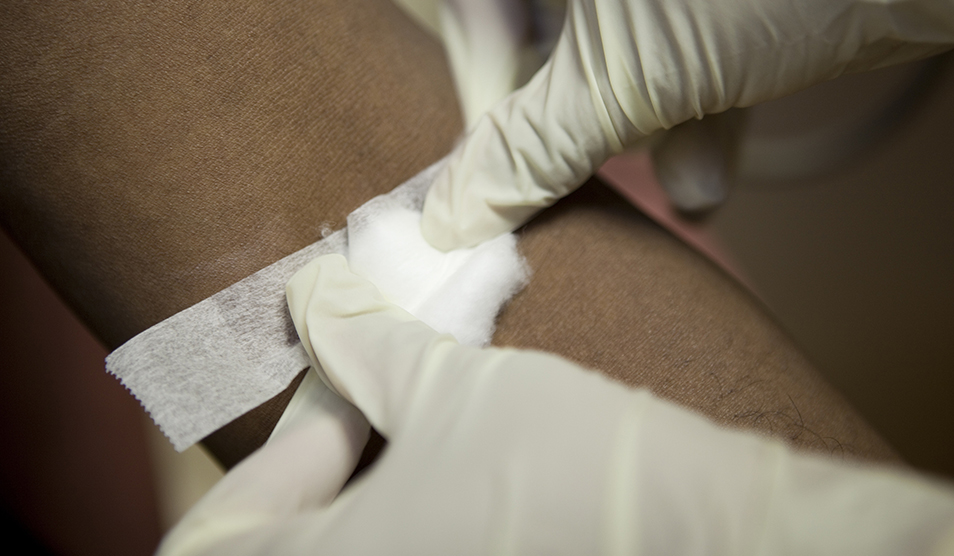Children's diabetes
Contact
- Outpatients appointments
- 020 3312 6482
Visitor Information
Translation help:
To translate this page into your preferred language, click the Google Translate icon in the top-right menu and select your desired language.
Our team provides a dedicated and dynamic service for children with diabetes.
We support and educate all our patients and families to manage their long-term condition and believe they are the centre of our team. We aim to lead the way in advanced diabetes practice and provide a range of education and support services for our patients, families and staff including facilitated parents’ groups, carbohydrate counting workshops for families, educational and peer-support building afternoons.
Care and management
Our children’s diabetes service provides comprehensive care and support to children with diabetes and their families. Each patient is assigned a key worker from diagnosis or their first hospital appointment with our service. Key workers help patients manage their condition and serve as resources for patients between appointments. Our treatments include flexible injection regimens and insulin pump therapy, as well as a variety of support and educational resources.
The service provides care to children and young people with diabetes from birth to their 19th birthday. We operate a unique service for all our local children and young people with diabetes, with a commitment to minimally disrupt the normal lives of the children and their families. We provide a large part of their care in the community, including home visits and working closely with all the professionals concerned. We also help young people with diabetes as they transition to adult care.
Clinic locations and contacts
Children's diabetes clinic
Address:
Paediatric outpatients department
Sixth floor
Queen Elizabeth Queen Mother (QEQM) building
St Mary’s Hospital
Praed Street
London W2 1NY
Contact: 020 3312 6482
Young adult diabetes clinic
Address:
Diabetes centre
First floor
Mint wing
St Mary’s Hospital
Praed Street
London W2 1NY
Please note: The Mint wing is accessible from South Wharf Road.
Contact: 020 3312 6482
Continuous glucose monitoring (CGM)
If your child is attending for a CGM attachment, they should attend the paediatric short stay unit (PSSU) on the seventh floor of the Queen Elizabeth Queen Mother (QEQM) building at St Mary’s Hospital.
Meet the team
- Dr Mando Watson – Consultant paediatrician
- Dr Samir Wassouf – Associate specialist
- Dr Karen Logan – Consultant paediatrician
- Dr Sudeshna Ghosh – Consultant paediatrician
- Chris Bound – Lead paediatric diabetes nurse specialist
- Soraia Vieira – Young persons and transition diabetes nurse specialist
- Zelalem Mengistu – Junior clinical nurse specialist
- Dr Annamarie Rankin – Clinical psychologist
Patient information
Before your appointment
You should attend all appointments with your child if they are under the age of 16. Carers and friends are also welcome. You may request a chaperone, and we will do our best to provide one.
Please keep a food diary with accurate food weights, blood glucose levels, and insulin doses for 4–5 days before the appointment. If using an insulin pump, perform a carb-free fast and download the pump 24 hours in advance.
Remember to bring: blood glucose meters, food diary, insulin pen, and hypo treatment.
During your appointment
Appointments usually last between 30 minutes and one hour, depending on the reason. This will be confirmed beforehand.
We are a teaching hospital; students may be present. Let staff know if you'd prefer they step out.
Appointments typically include diabetes management review, Q&A, blood tests, height and weight checks, education, CGM review, annual screening, and psychology input if needed.
Children require blood tests every three months, usually via finger prick, and annual full blood screens. CGMs are fitted once or twice a year for enhanced diabetes control understanding.
After your appointment
Your child will be assigned a key worker who will provide follow-up, support, and regular reviews every three months or more frequently if needed. They can also refer to psychology and dietitians as appropriate and liaise with schools or other services.
If your child is already known to our team, contact their key worker or call 020 3312 6482 with any concerns.
Referrals and GP information
GP referrals
Please use NHS e-Referrals to refer a patient to our children's diabetes service, listed under children’s endocrinology.
Secondary care
Contact our team on 020 3312 6482 to discuss referrals.
GP advice
For new diagnoses and diabetic emergencies, contact the on-call paediatric registrar via bleep 1202 on 020 3312 6666.
Further online resources
Clinical trials and research
We participate in the Address 2 project that is for any newly diagnosed type 1 diabetes patient over the age of five years. The idea of the project is twofold: to produce a register of type 1 diabetes that would give the patient access to other research projects in the future if they wish to partake and also to look at the differences in siblings’ genetics versus the newly diagnosed patient. The trial is ongoing at present with no finalised end date. Please speak to your key worker about this at diagnosis if you wish to take part.
Education and elective placements
We offer short placements for work experience students, medical students and nursing students. Please contact the Trust’s human resources team if you are outside the Trust, or your education lead if you are in the Trust.
- NHS choices – diabetes and your child
- Diabetes.co.uk – children and diabetes
- Diabetes UK children’s website
- Diabetes UK information for parents
- Juvenile Diabetes Research Foundation
Latest news See all news
-
 Read the full story
Read the full storySt Mary’s trialling 15-minute blood test for life-threatening conditions in children
St Mary’s Hospital is one of three hospitals involved in an NHS trial to find out if an innovative 15-minute blood test can diagnose children with potentially life-threatening infections.
-
 Read the full story
Read the full storyFinalists at HSJ Digital Awards
Imperial College Healthcare has been shortlisted for five HSJ Digital Awards.
-
 Read the full story
Read the full storyWorld-first gene-editing treatment for blood disorders including sickle cell disease approved for use in the NHS
NICE has today approved a gene-editing treatment for use with NHS patients over the age of 12 with a severe form of sickle cell disease.
